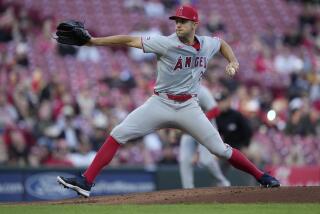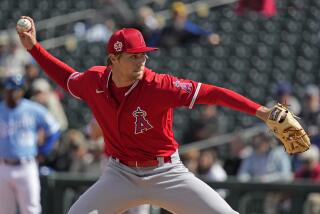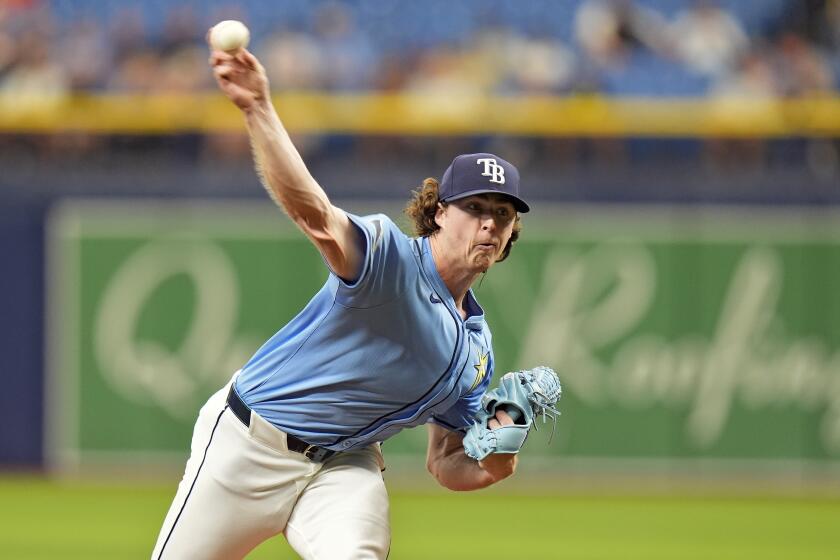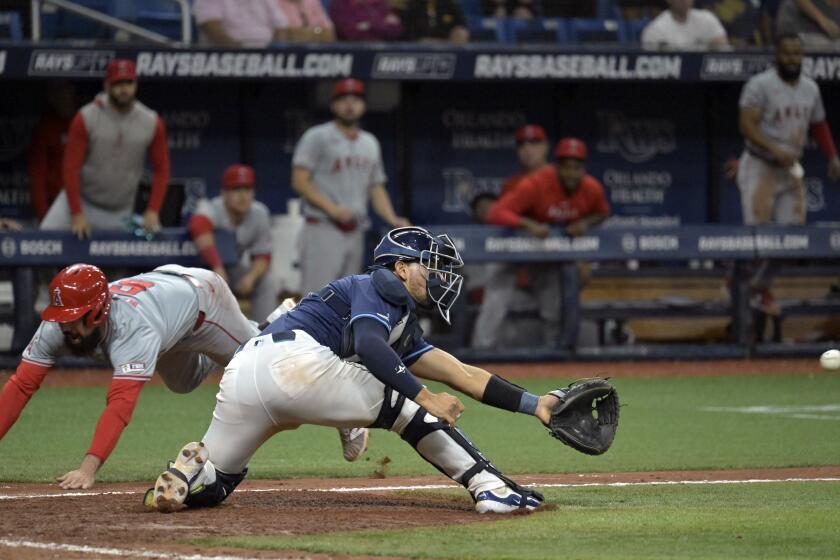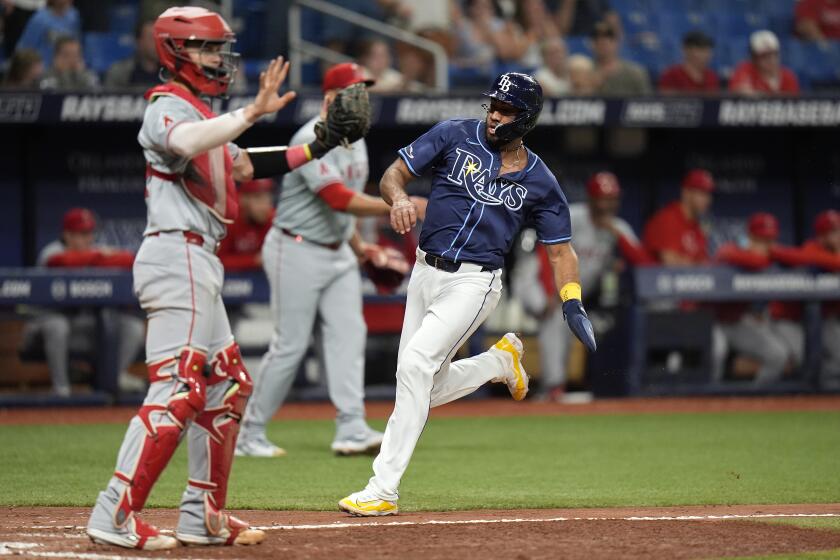The Great Steroids Debate: How have drugs changed baseball?
All week long, Mat “Halos Heaven” Gleason and New York Sun baseball writer Tim Marchman are debating steroids in baseball. Yesterday’s installment probed the possibilities and duties of Angels owner Arte Moreno in disciplining suspected Human Growth Hormone orderer Gary Matthews Jr. Today, our contestants answer the question: On a scale of 1 to 10, to what extent do you think steroids is responsible for the post-1993 offensive explosion in baseball? How have PEDs tangibly impacted the game?
Aesthetic revulsion against high scoring = steroids hysteria
By Tim Marchman
Mat,
As you know, something happened in baseball after the 1992 season. That year, the National League scored 3.88 runs per game. The next year it scored 4.49 runs per game, and scoring has stayed around that level ever since.
Many people -- and I’m among them -- find this an abomination. When scoring is high, baseball loses a lot of its charm. .210 hitters who make up for their weak bats with great baserunning and alert defense get turfed in favor of fat guys who stand around waiting for a ball they can hit out of the yard. There’s no strategy involved in a manager sending a bunch of weightlifters to the plate to draw walks and on to the field to try to avoid torn hamstrings.
This aesthetic revulsion is behind the steroid hysteria. Clearly people aren’t concerned about the effects on the health of athletes. If that were the case, there would be congressional hearings on football players routinely entering games with post-concussion syndrome, or mixed martial artists and amateur wrestlers engaging in the barbarous practice of weight-cutting. Just as clearly, there’s no real moral indignation involved. If people were repulsed enough by drug use in baseball, they’d stop paying to see it, and the game wouldn’t be enjoying ever-greater popularity, as measured by attendance and profits.
No, with honorable individual exceptions, people get outraged about steroids not out of concern for athletes or the integrity of the game, but because they’d rather see a more balanced game of baseball. They blame steroids for the death of the 100-stolen base man, the suicide squeeze, and the taut 2-1 pitcher’s duel. This isn’t a generally held opinion -- if it were, baseball teams wouldn’t be making so much money they literally can’t spend all of it -- but it does motivate many of the sniffy traditionalists who get loudest at the mouth about the death of honor and integrity in the sport of Cap Anson, Hal Chase, Joe Jackson and Pete Rose.
This doesn’t, though, make any sense. If steroids were responsible for the rise in offense, why did it rise so dramatically in one year? Why did the institution of reasonably stringent testing a couple of years ago not change the level of offense in the game? And why is steroid use presumed to affect only hitters, when pitchers juice just as much if not more?
The obvious answer is to these questions is that steroids are just one among many reasons why this is an era of power hitting, and probably not the most important. Smaller ballparks, weight training, thin-handled bats, umpires’ narrow interpretation of the strike zone and juiced baseballs are just a few of the reasons for the explosion in offense. I don’t know if any one of these is more important than the steroid needle, but in concert they certainly are. If I had to guess I’d say that on a 1-to-10 scale, steroids rate at about a three among reasons why baseball isn’t as good as it was when Whitey Herzog could stack the Cardinals lineup with seven leadoff men and Jack Clark and win a pennant. Their real impact has been at the margins: There are certainly some scrubs who wouldn’t be in the majors without the juice, and we have ample evidence that at the other end of the scale, drugs can take Hall of Famers and all-time greats and help them perform at historically unprecedented levels. This isn’t nothing, but if the aesthete wants his pleasing game back, he’d be just as well off petitioning the commissioner’s office to enforce the rules on the minimum weight of bats as he would to implore Congress to federalize steroids testing. And if the moralist needs to get involved in sports, he can start thinking about why it’s considered normal for a 17-year-old to sweat off 15 pounds of water hours before a wrestling match.
Tim Marchman writes about baseball for the New York Sun. He is certain that Rickey Henderson could still help a major league team if someone would give him a fair shot at a job.
We’ll never know. And that’s the problem
By Mat Gleason
Tim,
The evil of PED abuse is a classic case of the dog that did not bark. Juiced players take up roster spots that would have gone to other players -- in a meritocracy, those men might have made the adjustments necessary to star in the major leagues. But we’ll never know.
Juiced players pile on the stats and are compensated with money from teams that might make cuts in minor league scouting to afford Mister Jumbo Superstar. Did your team overlook the next Sandy Koufax when its scouts were laid off in a cost-cutting move to afford a juiced up “power arm” or “big bat”? We’ll never know.
We will never know how good a player a juice-free Barry Bonds would have been in this decade -- imagine him 10 sizes smaller and beginning this season less than 30 home runs away from Babe Ruth. The country would be rallying in his favor. We’ll never know just how great he was and what a force for good he could have been.
In 1988, I won tickets for great seats to a Dodger game. They pulled my number right out of the raffle jar. My brother and I had never sat so close to the field. And it was a great game -- the Dodgers won. In fact, they hit 22 singles. No extra base hits at all. The crowd got a chuckle when the visiting manager brought in a veteran shortstop to pitch the 9th inning, his team having given up 13 runs to Lasorda’s men in Blue.
How does a team give up 22 singles? Obviously, the manager blew it in regards to the choice of pitcher. But what if he had done this on purpose? What if he owed a bookie some money and had promised to throw the game? The manager that night was Pete Rose, and 14 months later he would be banned for life by baseball. But nobody talks about “What if” Pete Rose had not thrown so many Reds games when he was their manager.
Nobody laments the 1988 Reds because baseball meted out a swift, just and eternal punishment upon Pete Rose for his bringing into question the integrity of the sport.
We’ll never be able to gauge the tangible impact of PEDs on professional sports. But a strict code of player conduct and absolute punishment can still save us from ever having to wonder whether the whole damn game has been compromised.
Mat Gleason is the publisher of Coagula Art Journal. As “RevHalofan” he blogs daily about the Angels at Halos Heaven.
Off-label use of prescription drugs isn’t ‘evil,’ it’s American
By Tim Marchman
Mat,
As it happens, I agree with your first point here. Drugs in baseball are a problem because there are only so many jobs on offer, and so if one guy is juicing, rivals for his job have to choose between competing at a disadvantage and doing something that’s probably bad for their health.
Still, from the point of view of the fan, this makes no impact at all. There’s no difference between juiced-up scrub hitting .260 and the clean .250 hitting scrub he replaces. The only party who’s really harmed there is the .250 hitter. That’s why the Major League Baseball Player’s Association signed on for strong, comprehensive drug testing a couple of years ago, testing that’s far more stringent than that in other major sports -- to protect the majority of its members, who are fueled by nothing more powerful than grain alcohol and rainwater. Ballplayers are subject to having guys in white coats show up unannounced at their houses carrying plastic cups and demanding urine, and they’re subject to being suspended for half a season if the guy in the white coat doesn’t like what he finds. Make the testing much stricter or the punishment more absolute and we’ll be booting Commissioner Selig out of power in favor of Islam Karimov.
I also have to object to your use of the word “evil” in regards PED use. I know what evil is. PED use doesn’t come close to meeting the mark. Let’s keep in mind that when we’re talking about ballplayers using drugs, we’re talking about off-label use of prescription drugs, or use of illegally purchased Schedule III drugs. While I hope not to disillusion anyone, our society wouldn’t function without the former: Whether it be your nephew popping Adderall before taking the SAT, your lawyer snorting Ritalin to keep up as he plows through thousands of pages of documents in an all night billable session, your surgeon munching amphetamines while replacing your heart valve, or the hack journos you read doing all of the above as they try to clear their deadlines, using prescription drugs to do better at your job is right up there with driving at 70 on the list of shocking things Americans do. As to the latter, ballplayers using steroids are up there with club kids doing Special K and housewives popping barbiturates given to them by friends on the list of scallywags and ne’er-do-wells of modern civilization.
Pete Rose, by contrast, committed the cardinal sin of his profession. A manager gambling on baseball is like a mayor auctioning off a political appointment, a cop taking a bribe to cover up a murder, or a writer plagiarizing someone else’s work. Just as you wouldn’t compare those offenses to a mayor enjoying some Canadian Tylenol, a cop unwinding with a Vicodin, or a writer breaking out the stash of ADD pills to keep working on article, comparing even the most egregious of baseballs drug users to Pete Rose is lunacy.
More to Read
Go beyond the scoreboard
Get the latest on L.A.'s teams in the daily Sports Report newsletter.
You may occasionally receive promotional content from the Los Angeles Times.
